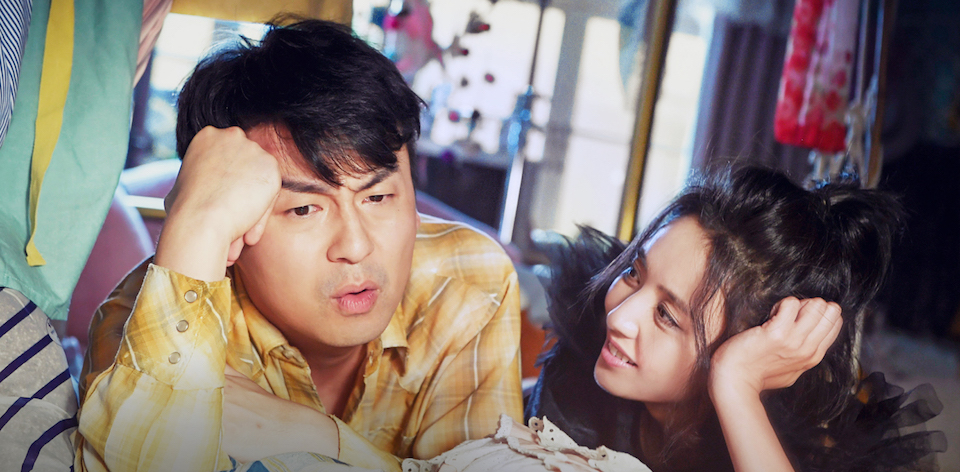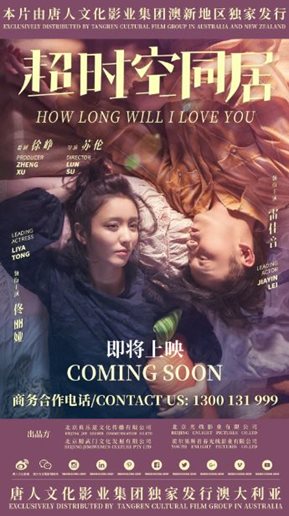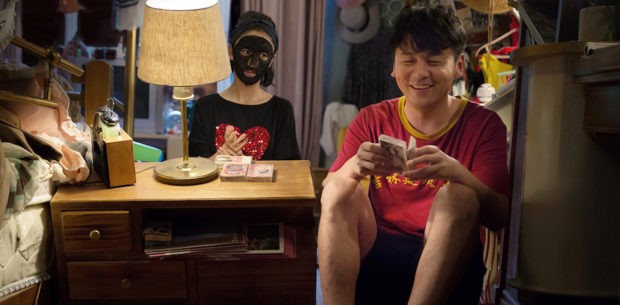Remember 1999? Things were very different back then. Audiences excitedly awaited The Phantom Menace, “…Baby One More Time” and “Mambo No. 5″ were racing up the music charts, and Kevin Spacey was still just an Oscar nominee. It was the first calendar year to be named after a Prince song. As China celebrated the 50th anniversary of the founding of the People’s Republic, little did we know a rift in time and space was opening.
HOW LONG WILL I LOVE YOU (超时空同居) follows Gu Xiao-Jiao (Tong Liya), a young woman in 2018 trying to break into the lifestyle of the rich and infamous, before losing all of her money in a swindle. Back in 1999, Lu Ming (Jia Ying Lei) is a down-on-his-luck property designer who is desperate to make his mark on the world. When their apartments merge and they suddenly wake up in the same bed, they try and bring about changes to alter their destinies. However, a mysterious man is control their fate behind the scenes.
There’s a definite sense that we’ve been here before with The Time Travellers’ Wife or more specifically The Lake House. It’s time travel, so maybe we have. Yet director Xu Lun immediately marks his film with a visually distinct motif. As the time periods come together, the apartments themselves ripple and crack in the merge, creating a mash-up of the time periods. There’s particularly slick culture montages as Xiao-Jiao and Lu respectively walk into each other’s native eras, albeit a slightly more bizarre reenactment of several films, including Titanic and Brokeback Mountain.
As with any romance, the success ultimately comes down to the likability of the leads. Wild City‘s Tong Liya (seen most recently in a small Detective Chinatown 2 role) has a nice character arc that leads her from narcissism to romanticism, while Jia Ying Lei (TV’s Peace Hotel) is just affably endearing. A dinner party sequence, in which Xiao-Jiao tries to pass off Lu as her rich husband, is a bit of fun, but the inevitability of their coupling makes many of these moments much ado about nothing.
As Xu Lun seems to take this romance as a fait accompli, there’s a number of missed opportunities in the rush to resolve the third act. By this stage, the film has become complicated with a much daker sub-plot involving a future figure trying to crack the space-time continuum for his own purposes. Abandoning its own time travel rules, Xu Lun still manages to include a ‘race for your love’ trope in the last 20 minutes, even if we’re not entirely sure how we got there.
On one level, the film can probably be read as a call to a return of simpler non-capitalist values, romanticising the late 1990s in the same way we once thought about the 1950s. 19 years may not seem like much in a lifetime, but those subtle differences are a world apart in some cases. Luckily, Xu Lun doesn’t spend too much time wandering through the minefield of outdated technology gags that this film could have relied on. Yet it’s all in the name of inoffensive fun, and as we fade out over what seems to be a When Harry Met Sally… to-camera tribute (untranslated in our screening), you won’t be wishing that you could turn back time.
[stextbox id=”grey” bgcolor=”F2F2F2″ mleft=”5″ mright=”5″ image=”null”]![]() 2018 | China | DIRECTOR: Xu Lun | WRITERS: Xu Lun | CAST: Tong Liya, Jia Ying Lei, Xu Zheng | DISTRIBUTOR: Tangren Cultural Film Group (AUS), Well Go USA (25 May 2018) | RUNNING TIME: 103 minutes | RELEASE DATE: 18 May 2018 (China/AUS), 25 May 2018 (US) [/stextbox]
2018 | China | DIRECTOR: Xu Lun | WRITERS: Xu Lun | CAST: Tong Liya, Jia Ying Lei, Xu Zheng | DISTRIBUTOR: Tangren Cultural Film Group (AUS), Well Go USA (25 May 2018) | RUNNING TIME: 103 minutes | RELEASE DATE: 18 May 2018 (China/AUS), 25 May 2018 (US) [/stextbox]






